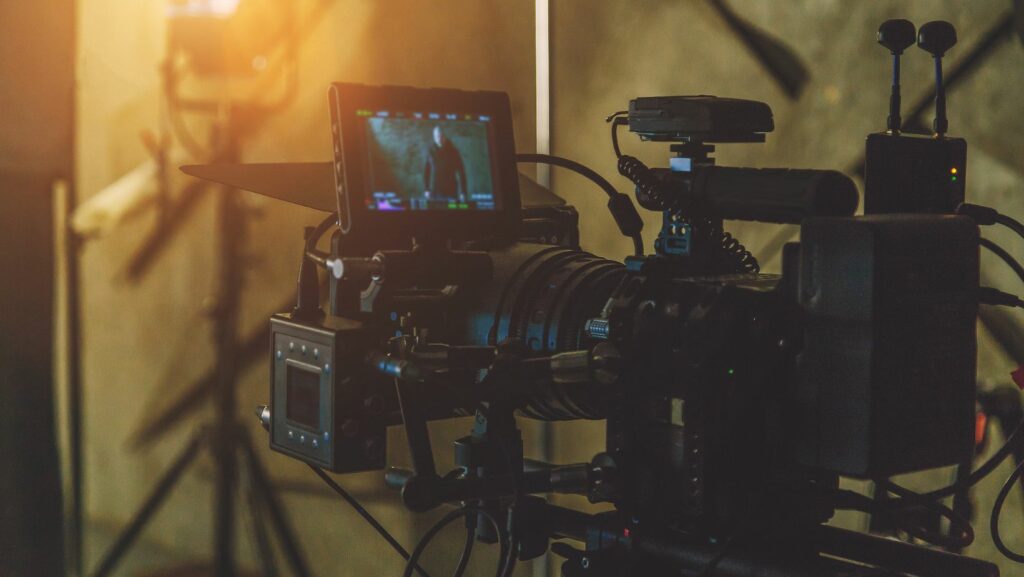Movie Soundtrack Songs
Early movie soundtracks primarily featured orchestral scores. Live orchestras accompanied silent films to enhance the visual storytelling. With the advent of synchronized sound in the late 1920s, music became integral to dialogue scenes, shaping mood and tone.
 During the Golden Age of Hollywood (1930s-1950s), composers like Max Steiner and Bernard Herrmann created iconic scores. Films like “Gone with the Wind” and “Psycho” showcased the power of orchestral music. These scores became an inseparable part of cinematic history.
During the Golden Age of Hollywood (1930s-1950s), composers like Max Steiner and Bernard Herrmann created iconic scores. Films like “Gone with the Wind” and “Psycho” showcased the power of orchestral music. These scores became an inseparable part of cinematic history.
In the 1960s, popular music started influencing soundtracks. Films such as “The Graduate” featured contemporary songs by artists like Simon & Garfunkel. This trend continued in the 1970s, with films like “Saturday Night Fever” using disco music to reflect cultural shifts.
The 1980s saw the rise of blockbuster movies with memorable songs. Soundtracks became commercial successes, with films like “Footloose” and “Top Gun” producing chart-topping hits. Music videos and radio play boosted the popularity of these songs, integrating them into popular culture.
The 1990s and early 2000s diversified soundtrack genres. Quentin Tarantino’s “Pulp Fiction” revived surf rock and soul throwbacks. Disney animated films like “The Lion King” used original songs by renowned composers and artists, making soundtracks essential for storytelling.
In recent years, curated soundtracks by high-profile artists define movies. Guardians of the Galaxy’s “Awesome Mix” blend of 1970s hits exemplifies this trend. Unique soundtracks create deeper connections with audiences, enhancing emotional impact.
Iconic Movie Soundtrack Songs Through The Decades
Movie soundtracks have given audiences unforgettable moments, transcending the screen to embed themselves in cultural and personal memories. Each decade contributed to this musical legacy.
The 1970s showcased a range of influential movie soundtrack songs. “Stayin’ Alive” by the Bee Gees, featured in Saturday Night Fever (1977), defined the disco era. Simultaneously, “The Sound of Silence” by Simon & Garfunkel became synonymous with The Graduate (1967), despite being released in the 60s, illustrating a blend of decades. “Gonna Fly Now” from Rocky (1976) also became an anthem of perseverance.
 The 1980s saw the rise of blockbuster soundtracks. Kenny Loggins’ “Footloose” from Footloose (1984) captured the spirit of teenage rebellion. “Eye of the Tiger” by Survivor became an instant classic following Rocky III (1982), and Whitney Houston’s “I Will Always Love You” gained global recognition from The Bodyguard (1992). Prince’s “Purple Rain” (1984) from the film of the same name blurred the lines between film scores and mainstream albums.
The 1980s saw the rise of blockbuster soundtracks. Kenny Loggins’ “Footloose” from Footloose (1984) captured the spirit of teenage rebellion. “Eye of the Tiger” by Survivor became an instant classic following Rocky III (1982), and Whitney Houston’s “I Will Always Love You” gained global recognition from The Bodyguard (1992). Prince’s “Purple Rain” (1984) from the film of the same name blurred the lines between film scores and mainstream albums.
Soundtracks in the 1990s diversified with genres catering to varied audiences. Titanic (1997) brought Celine Dion’s “My Heart Will Go On” into the spotlight, becoming an international hit. Pulp Fiction (1994) revitalized surf rock with songs like “Misirlou.” The use of rap and hip-hop surged, exemplified by 8 Mile (2002), featuring Eminem’s “Lose Yourself,” winning an Academy Award for Best Original Song.
In the 2000s and beyond, the trend of curated soundtracks continued. Guardians of the Galaxy (2014) featured the nostalgic “Awesome Mix Vol. 1,” blending various decades’ hits. Films like Frozen (2013) with “Let It Go” underscored the power of original compositions in animated films. Curated soundtracks from artists like Lorde for The Hunger Games (2013) showcased how contemporary music tracks contributed to a film’s narrative and cultural impact.
Genres And Themes In Movie Soundtrack Songs
Movie soundtrack songs span various genres and themes, enhancing different aspects of the film. Each genre of music can evoke specific emotions and heighten audience engagement.
Romantic scores often feature orchestral arrangements, piano melodies, and string sections. Examples include “My Heart Will Go On” from “Titanic” and “Moon River” from “Breakfast at Tiffany’s.” These songs emphasize emotions like love, longing, and nostalgia, complementing romantic plotlines. Composers like John Williams and Ennio Morricone have excelled in crafting such evocative pieces.
 Action-packed tracks deliver high-energy experiences using powerful bass lines, fast tempos, and intense rhythms. Examples include “Eye of the Tiger” from “Rocky III” and “Danger Zone” from “Top Gun.” These songs match the adrenaline of action scenes, intensifying the excitement. Hans Zimmer and Junkie XL are known for their contributions to this genre, creating pulse-pounding scores for films like “Mad Max: Fury Road” and “Inception.”
Action-packed tracks deliver high-energy experiences using powerful bass lines, fast tempos, and intense rhythms. Examples include “Eye of the Tiger” from “Rocky III” and “Danger Zone” from “Top Gun.” These songs match the adrenaline of action scenes, intensifying the excitement. Hans Zimmer and Junkie XL are known for their contributions to this genre, creating pulse-pounding scores for films like “Mad Max: Fury Road” and “Inception.”
Horror and thriller tunes use dissonant harmonies, eerie soundscapes, and sudden crescendos to generate fear and suspense. Examples include the iconic theme from “Psycho” and John Carpenter’s “Halloween” score. These tracks manipulate the audience’s emotions, building tension and unease. Composers like Bernard Herrmann and Angelo Badalamenti have masterfully developed soundtracks that amplify the terrifying atmosphere.

